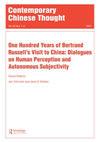进步还是改变?重新思考《尚主书》的历史观
IF 0.4
3区 哲学
0 ASIAN STUDIES
引用次数: 0
摘要
编者按:本文是对《尚主书》中提出的“随时而变”本质的反思。作者对以马克思主义为主的现代观点提出了质疑,认为商鞅是一位杰出的战国统治者,提倡一种进步的历史观。《尚主书》没有把未来置于现在之上,也没有把现在置于过去之上,也没有设想对历史趋势的大规模理性理解,也没有设想改善人性的可能性。像其他周末、秦汉的资料一样,书中的一些章节在具体的背景下,作为一种政治权宜之计,提倡随时代而变化的能力。作者利用这一认识来驳斥仍然流行的将商鞅视为“进步”思想家的观念。作者认为,如果这种压迫性的意识形态促进了进步的概念,那么进步的概念本身就应该受到质疑。本文章由计算机程序翻译,如有差异,请以英文原文为准。
Progress or Change? Rethinking the Historical Outlook of the Book of Lord Shang
EDITOR’S ABSTRACT This article is a reflection on the nature of “changing with the times” that is put forward in the Book of Lord Shang. The author challenges the modern, predominantly Marxist, portrayal of Shang Yang as the exceptional Warring States master promoting a progressive view of history. The Book of Lord Shang does not prioritize future over the present or present over the past, nor does it envision a large-scale rational understanding of the historical trends, nor the possibility to improve human nature. Like other late Zhou, Qin, and Han sources, some chapters of the book promote the capacity to change with the times as a political expediency in concrete contexts. The author utilizes this understanding to dismiss the still popular conceptualization of Shang Yang as a “progressive” thinker. If this oppressive ideology promoted the idea of progress, then the very idea of progress should be called into question, according to the author.
求助全文
通过发布文献求助,成功后即可免费获取论文全文。
去求助
来源期刊

CONTEMPORARY CHINESE THOUGHT
Multiple-
CiteScore
0.10
自引率
0.00%
发文量
0
期刊介绍:
This wide ranging journal is essential reading for anyone who wants to understand the diverse themes and influences that shape Chinese thought today. It features translations of the most current and influential Chinese writings on all aspects of philosophical endeavor, from theoretical essays on systems to studies of China"s cultural and religious development, from interpretations of the Chinese classics to exegeses on Marxist thought.
 求助内容:
求助内容: 应助结果提醒方式:
应助结果提醒方式:


